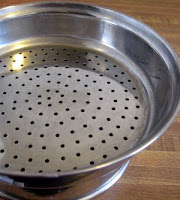Vaishali's posts are doing much to help me make vegan versions of Indian desserts- she makes delectable vegan halwas of every hue with no dairy in sight. Using her gajar halwa as my inspiration, I made this version yesterday. To mimic the gritty texture of cooked-down milk/khoya, I used some almond meal.
Gajar Halwa That Just Happens To Be Vegan
- Shred 2 lbs. organic carrots using a hand grater or a food processor.
- In a heavy pan, heat 2 tbsp. Earth Balance buttery spread.
- Saute the carrots until bright red.
- Stir in 1 cup almond milk and 4 tbsp. almond meal (or finely ground almonds).
- Cook, stirring often, until the mixture reduces and the carrots are cooked.
- Stir in 1 tsp. cardamom and sugar to taste (I only needed a quarter cup or so).
The taste of the gajar halwa was wonderful. It is light and nutty and something I will be making again and again, whether or not I have vegan guests.
I shared this halwa at a cook-out last night with a group of St. Louis food bloggers. We met in the incredible teaching kitchen of the Kitchen Conservatory (candyland for foodies), and I'm so glad Alanna put in the time and effort to organize this event. St. Louis has many creative and clever food bloggers. They do all sorts of fun things like keep bees and grow garlic and match shelter dogs to families!
If you are a food blogger, have you met other food bloggers in your city?
On The Bookshelf
I read more than my fair share of novels and magazines, but one of my favorite genres will always be non-fiction. They say truth is stranger than fiction and I certainly believe that based on the non-fiction I've read.
When written with humor and expertise, non-fiction books can give us a crash course in a serious academic discipline and connect abstract concepts in maths and science and technology with real life. I recently read The Drunkard's Walk by Leonard Mlodinow and it was a most entertaining glimpse into the role of statistics in everyday life. Another highly fascinating and riveting read was The Ghost Map by Steven Johnson, which is a great detective story of a physician chasing a microbe (and sparking off the science of epidemiology) even though he did not even know it at the time.
This morning I awoke at 4 AM to finish reading Zeitoun by Dave Eggers, the real story of a family in the days following Hurricane Katrina. Eggers is a talented writer. The story is written so simply but the narrative is gripping and you get deeply engaged with the characters as the story progresses. I highly recommend this book.
There are two non-fiction books that I read in recent months that had rich and meaningful content but where the writing was unfortunately very jagged and rambling, in my opinion, which took away from the reading experience. These were Three Cups of Tea by Greg Mortensen about one man's struggle to build schools in remote regions of Central Asia and Mountains Beyond Mountains by Tracy Kidder, about the life and work of Paul Farmer in bringing healthcare to the most impoverished regions of Haiti. But these are the kinds of books that are worth reading, because they make me want to do something meaningful and with my life and stop making excuses already.
Next on the non-fiction list, I'm going to start with a memoir called In Hanuman's Hands by Cheeni Rao; I read Kamini's stunning review of the book and checked it out from the library this weekend.
Have you read any interesting non-fiction lately?




















